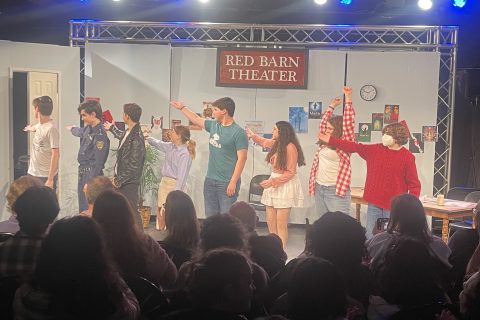By Olivia Goldman
2,401.5 miles. If you were born in Westchester, New York, then that number has determined the quality of your life. If you had been born 2,401.5 miles south, then there is a 63% chance that your childhood would have been immensely affected by gang violence, and a mere 4% chance that America’s immigration system would provide you a shot at a better life.
Temple Israel Center, my synagogue, offers a trip every year for students aged 8th grade – 12th grade to learn about an important social issue for a few days. Going into my trip to Arizona this past April, I anticipated gaining insights into immigration rights; what I didn’t anticipate was a life-altering perspective change on the precious privileges I have been given.
The trip, run through the organization Tzedek America, immersed my peers and I in the harsh realities of the immigration system. We listened to firsthand accounts from individuals who have been through unspeakable tortures just for a chance at a new life in the land I’ve been blessed to call home. We left with a profound view of the immense courage and resilience it takes to seek a better life, all the uncertainty and challenges these immigrants faced, and their amazing perseverance.
My fellow students and I hiked the treacherous trails that families and children endure for weeks on end, hunted by border patrol and desperate for a life free from oppression. During the hike we carried food and water, placing them under trees along the route, aiming to provide sustenance for those spending weeks on end in the terrible conditions that are the hilly deserts of Arizona.
The majority of people who are coming into the country illegally are trying to find a life where their kids can be kids, instead of living in fear that they will become victims of gang violence or drug addiction. Mothers and fathers want to provide a life that they were never given, a life that the majority of people in the U.S. are lucky enough to have. Determined families risking everything for their children do not deserve death; they deserve understanding and protection.
Border control agents and officials from Homeland Security provided valuable insights into the broader context of immigration enforcement. One speaker we heard from had a different mindset from mine. He believed that if people’s lives were not in imminent danger in their home country and were trying to enter the country anyway, then they were “gaming the system”. As much as I was emotionally impacted by the testimonies from immigrants earlier in the trip, this lecture led to my most profound thinking. At first, much of what he was saying resonated with me, but then this question crossed my mind, “Should the place where we are born be the sole determining factor for the quality of life we are entitled to lead?”
It’s understandable for people to believe that if someone’s life is not in imminent danger in their home country, our country has no moral obligation to provide them asylum. However, safety is not the sole consideration. Every person, regardless of where they were born, deserves the right to pursue a life of opportunity. Perhaps they live in a country where women are not allowed to work or be educated: they are not necessarily in danger, but what gives me the right to those freedoms rather than them? It’s not about comparing qualities of life necessarily, but about recognizing the fundamental right to lead a life opportunity and safety. I am eternally grateful for my ancestors who braved the journey from Europe to the United States and I think that that opportunity needs to be extended to people trying to enter the country in this century. If someone is strong enough to brave the journey from their home country to the US, why do they not deserve an equal chance at an enjoyable life as we do?
My journey to Arizona was not merely a trip, but a transformative experience that challenged my perception of society and the way the entire world works. Throughout this article I referred to America as “our country” because we are the ones who can determine whom we provide with our resources, but it’s not really ours. It’s just due to the determination of our ancestors that we were born here, on this piece of land, instead of a piece of land 2000 miles south, on the other side of a wall.




